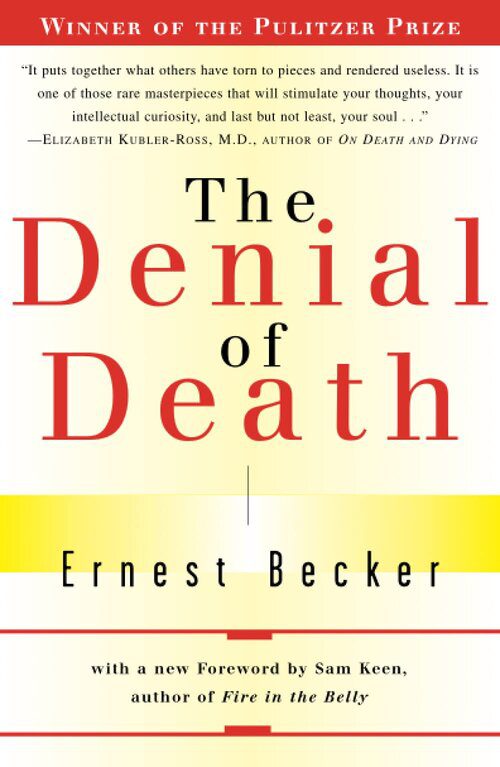The irony of man’s condition is that the deepest need is to be free of the anxiety of death and annihilation; but it is life itself which awakens it, and so we must shrink from being fully alive.
In The Denial of Death, American cultural anthropologist Ernest Becker argues that most human action is taken to ignore or avoid the inevitability of death. The 1974 Pulitzer Prize-winning book builds on the works of Otto Rank, Søren Kierkegaard, Sigmund Freud, and Norman O. Brown. It discusses the psychological and philosophical implications of how people and cultures have reacted to the concept of death.
Key Takeaways – The Denial of Death by Ernest Becker
Human Denial
We enter symbiotic relationships in order to get the security we need, in order to get relief from our anxieties, our aloneness and helplessness; but these relationships also bind us, they enslave us even further because they support the lie we have fashioned. So we strain against them in order to be more free. The irony is that we do this straining uncritically, in a struggle within our own armor, as it were; and so we increase our drivenness, the second-hand quality of our struggle for freedom. Even in our flirtations with anxiety we are unconscious of our motives. We seek stress, we push our own limits, but we do it with our screen against despair and not with despair itself.
We do it with the stock market, with sports cars, with atomic missiles, with the success ladder in the corporation or the competition in the university. We do it in the prison of a dialogue with our own little family, by marrying against their wishes or choosing a way of life because they frown on it, and so on. Hence the complicated and second-hand quality of our entire drivenness.
Even in our passions we are nursery children playing with toys that represent the real world. Even when these toys crash and cost us our lives or our sanity, we are cheated of the consolation that we were in the real world instead of the playpen of our fantasies. We still did not meet our doom on our own manly terms, in contest with objective reality. It is fateful and ironic how the lie we need in order to live dooms us to a life that is never really ours.
It is fateful and ironic how the lie we need in order to live dooms us to a life that is never really ours.
Neurosis
Neurosis is another word for describing a complicated technique for avoiding misery, but the reality is misery. That is why from earliest times, sages have insisted that to see reality, one must die and be reborn.
Jonah Syndrome – Evasion of Growth
“Maslow used an apt term for this evasion of growth, this fear of realizing one’s own fullest powers. He called it the “Jonah Syndrome.” He understood the syndrome as the evasion of the full intensity of life:
We are just not strong enough to endure more! It is just too shaking and wearing. So often people in… ecstatic moments say, “It’s too much,” or “I can’t stand it,” or “I could die”…. Delirious happiness cannot be borne for long. Our organisms are just too weak for any large doses of greatness….”
“The Jonah Syndrome, then, seen from this basic point of view, is “partly a justified fear of being torn apart, of losing control, of being shattered and disintegrated, even of being killed by the experience.” And the result of this syndrome is what we would expect a weak organism to do: to cut back the full intensity of life:”
“For some people this evasion of one’s own growth, setting low levels of aspiration, the fear of doing what one is capable of doing, voluntary self-crippling, pseudo-stupidity, mock-humility are in fact defenses against grandiosity…
All the Best in your quest to get better. Don’t Settle: Live with Passion.

Comments are closed.